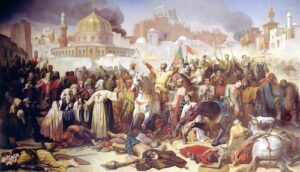A number of years back, I heard something that changed my whole perspective on the gospels in the New Testament. The biblical scholar John Dominic Crossan was speaking about the narratives of the life of Jesus, so central to that Bible and how people in the church hear them. Then he made this simple observation: “We keep thinking we’re the Jesus people in the story. We’re not. We’re the Romans.”
Maybe most people listening thought nothing of the statement. Perhaps they already knew it. But not me. It was one of those moments where I suddenly felt the light come on, and watched as the puzzle piece that never fit suddenly fell right into place. Of course, I remember thinking, we in the church always read these Jesus stories as if we’re meant to identify with the underdogs, the poor, the marginalized people who may have made up much of the early Jesus movement. We’re those persecuted ones. We’re the sinners in need of redemption, and we’re those who must fight against the powers of the world that don’t understand the truth that we know in our hearts.
Of course—that’s how I had always heard the story. But what if Crossan is right? What if that’s not true? What if we’re the Romans instead?
As Crossan went on to point out so succinctly (an argument made more completely in his God and Empire: Jesus Against Rome, Then and Now), we Americans are the ones—like the Romans of Jesus’ times—with military outposts throughout the empire. He could have also said that, like the Romans, we’re the ones who attempt to control various governmental states, either through foreign aid, monetary power, or threats of incursion and violence. We too believe that we have settled on the ideal form of government and that our citizenship (often related to our ethnic background) confers special privileges, privileges denied those “less fortunate” peoples in other lands, and even within our own borders.
We believe, like the Romans, that it’s our job to export our “way of life,” not because we enjoy power, but because we’re “givers” of opportunity. That giving may often involve violence, but it’s only done for the good of those we’re battling, if they only knew it. We too have built massive wealth for a few on the labor of poor and enslaved people. In so many ways—ways that powerful empires always work—we Americans are the Romans in the Jesus story. We believe and act in similar ways with similar justifications. It’s the essence of “Empire” thinking.
This simple change in emphasis illuminated so many things for me that evening, and in the years since, that they completely changed the way I read and thought about the Jesus stories.
Rome did as Rome does
I thought of this fundamental insight this summer, when President Trump’s Attorney General gave the order to clear the park near the White House with police, tear gas, and rubber bullets so the president could stage a photo-op with the Bible in front of St. John’s Episcopal Church. He didn’t go into the church; he didn’t speak about religion or offer up a Biblical passage. He simply delivered a visual message that said, “No one is going to stop me; I’m the most powerful person in the country and my wishes will not be denied.” Once the pictures were taken, the entourage moved back to the White House. They’d never even asked permission to use the site for this clearly political display.
My thought, watching it, was simple: Rome just did what Rome does.

Taking of Jerusalem by the Crusaders
I couldn’t help but also think of a few of the paintings depicting the Crusades centuries after that invasion by Europe of the Middle East. There’s one in particular called “Taking of Jerusalem by the Crusaders, 15th July 1099” by Emile Signol. He painted the picture in 1847, about an event that transpired nine centuries earlier. Signol was a pure neoclassicist, and the painting is clearly one meant to speak to triumphant imperialism in bold and formal tones.
Of course, the painting isn’t historically accurate. But that didn’t matter to Signol or to the painting’s audience. To its time, the work was a vision of European Christianity’s victory over the people of Palestine. To Signol—and/or to those viewing the painting—it was also picturing a triumph of culture over ignorance, of civilizing forces over disordered society. And specifically (and perhaps unconsciously), it was the white European’s victory over non-white Muslims (similar to the way that most Confederate statues were less about honoring the Civil War dead than they were about promoting 20th century white supremacy).
In some ways, it’s not all that different from the ideas that sold people on the first Crusade back in the 11th century. And it’s not all that different from the story we tell ourselves today, every time we enter another country for their “own good.” Sure, we went into Iraq on the basis of false information about WMDs. But in the rhetoric of the lead up to the war, we were also said to be bringing “democracy” to people who would welcome us with open arms, as we carried our own success and knowledge to those “less fortunate people.”
The Romans would have been proud of both the painting and the story it told. The way the commander of the Crusaders throws his arms back in triumph, looking to the skies (and God) while a nearby soldier with a cross on his breast mirrors the gaze upwards with his arms open in victory tells the viewer that this is a holy war and that God is aligned with not simply believers, but with military power, troops, violence, and strength. This is precisely the Roman ideology in picture form, made in a new age of empire building. The setting has changed, but the attitude—the attitude of empire—is the same.
We’re the Romans.
The President’s summer photo-op, and indeed, much of the last four years of his presidency, has been exactly the same kind of display. The troops had gone before, clearing the way, moving the human resistance out of his path. The leader stood in front of a symbol of civilization-made-sacred, the church near the leader’s palace. Instead of a sword, Trump holds the Bible. Instead of looking to the sky, he looks into a camera. But the message, one that equates a book that contains the story of Jesus with military power, force and violence, is understood.
Except, of course, while there’s a great deal of room for interpretation regarding Jesus and his teachings, it’s safe to say that Jesus’s story isn’t the story of a Roman or building an empire. It’s a story of a life lived over and against the Romans and their empire. The Jesus movement wasn’t a movement capable of military strength and power, but found itself at the mercy of its use by the Roman troops stationed in Palestine. It wasn’t a movement based on fidelity to the leader of the empire; indeed the very title “Son of God” was one given to the Emperor, and by appropriating it, the earliest followers of Jesus spoke volumes about where their loyalty really lay.
By withholding loyalty (always demanded by rulers who see themselves as the Empire), the early movement led by Jesus was always involved in an implicit (and perhaps sometimes explicit) critique over and against the Romans. Add to this the advocating of the traditional Jewish values of goodness and mercy, forgiveness and justice—values opposed to the Roman empire’s conquering and violence—and you have two forces in clear opposition.
But we, by virtue of who we are and when we live, are the Romans. Donald Trump in front of St. John’s, or strutting in front of a rally crowd and basking in its glorification, is the very image of empire thinking. Yet, here is where it can become confusing. That day in July, Trump is pictured holding a book which contains stories about Jesus, who’s killed by the very Empire he shares so much of this ideology with.
Jesus, the central figure of that Bible, is killed by the Empire that espouses the very values held by the President. And yet, in a kind of irony too subtle for the President and his followers to understand, the message of that book—one of justice, kindness, mercy—speaks in opposition to the power and dominance of the Empire and to the values of the very man holding it aloft.
You can certainly argue that the early church found opposing the Empire to be an unwinnable war. Their early opposition to empire in time changed into values more acceptable to Rome, in order to blend in and be safe. And perhaps the survival of Christianity as we know it would not have been possible if that accommodation had not been made.
But we cannot give ourselves over to the illusion that what the President did in any way wasn’t a massive fraud, a cynical bit of hypocrisy. It’s clear from what we know that President Trump doesn’t know the Bible and doesn’t care about the Bible. But we do know that his view of America in the world is grounded in the same set of ideas that Rome held when they nailed Jesus to the cross. He is anything but the man whose story he held awkwardly in the air.
We’re the Romans. Until American Christians come to terms with this shift, Trump or no Trump, we will not be able to fully appreciate the story in that book the President held, so uncomfortably. Nor can we understand what’s happening in our country today.





